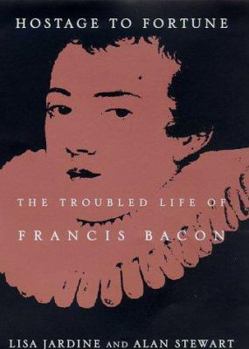Hostage to Fortune: The Troubled Life of Francis Bacon
Select Format
Select Condition 
Book Overview
The statesman, scientist, and philosopher Francis Bacon (1561-1626) lived a divided life, and in the centuries since his death questions about his true nature have abounded. Was Bacon a noble scholar who longed for solitary contemplation of higher philosophical truths, or was he a conniving political crook? Was he a captive of his birth and upbringing, an innocent caught in a web of political intrigue? Was he a homosexual? Lisa Jardine and Alan Stewart boldly pursue the answers to these questions using a massive volume of previously untapped archival sources. The result is a brilliant and nuanced portrait of the quintessential Renaissance man. Book jacket.
Format:Paperback
Language:English
ISBN:0809055406
ISBN13:9780809055401
Release Date:January 2000
Publisher:Hill & Wang
Length:637 Pages
Weight:1.77 lbs.
Dimensions:1.7" x 5.5" x 8.7"
Customer Reviews
2 ratings
All about the life, little about the man
Published by Thriftbooks.com User , 19 years ago
This book is in many ways superb. The writing is smooth, the judgments intelligently based on evidence, the archival research prodigious. But it leaves one with oddly little sense of Bacon the man. Partly that's because the authors don't speculate, confining themselves to the historical record. That's a great virtue, but it also means we never get a sense of Bacon's relations with his wife, or even his sexuality. We hear about his chronically poor health, but not what his symptoms suggest to a modern doctor. Also, the authors don't examine Bacon's writings in any sort of detail. This is definitely a "life and times", not a "life and letters." The authors rarely step back to give an overall picture. There are no scene-setting panoramas, no authorial intrusions to explain why, for example, they decided to go into such detail about the activities of Bacon's brother Anthony. One gathers that the authors believe Anthony and Francis were working closely together, but I would have liked to have their thinking explained more fully. (Although Anthony is practically the main character of the first quarter of the book, his death is mentioned only in passing.) These criticisms reflect my occasional irritation with the book, but they don't detract from the authors' tremendous achievement. If the authors had included everything I missed, the book would have been quite a bit fatter, and that would have been a negative, too. As it is, the book is (just barely) small enough to be read without risk of injury, unlike so many other modern biographies. The book contains a great deal about Bacon's political activities, as another reviewer has noted. That's because a great deal of Bacon's life was occupied with political activities. If all you want to read about is Bacon's scientific works, you shouldn't read a biography of their author. In the case of Isaac Newton, there is practically no difference between the life and the scientific work. But in Bacon's case, there is not only a difference but a dichotomy. He was a successful lawyer and politician who also happened to kick-start the Scientific Revolution. To summarize, Hostage to Fortune provides all the details, but not the outline. My advice would be to familiarize yourself with the basic course of Bacon's life and his achievements before reading this book, so you can fully appreciate its richness.
Bacon for sceptics.
Published by Thriftbooks.com User , 23 years ago
While the book starts slowly with what seems to be an overly detailed account of Bacon's family and their activities, it is a clear headed and balanced account of a man who achieved fame across the centuries, as well as in his own time---but never great virtue, character or happiness in his own life. It is quite readable, and even engrossing in the second half. Scholars will appreciate the careful documentation and extensive reference to sources and supporting materials.






